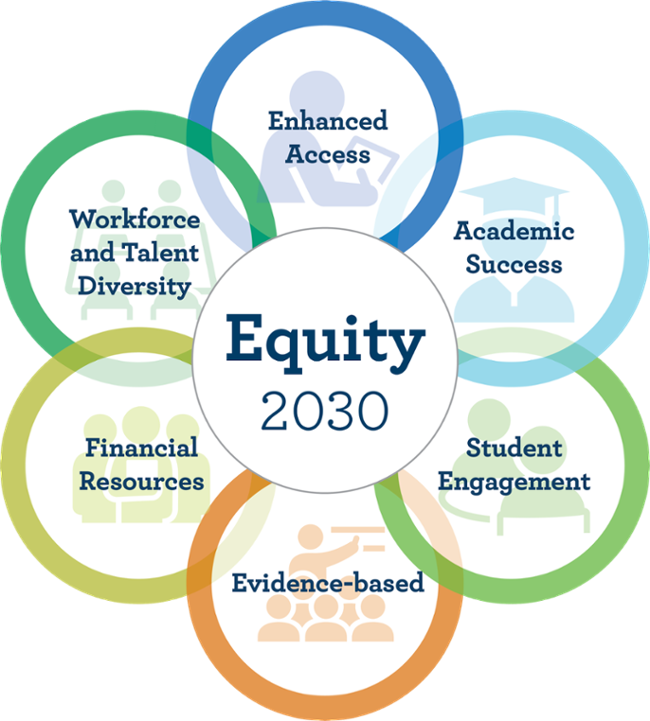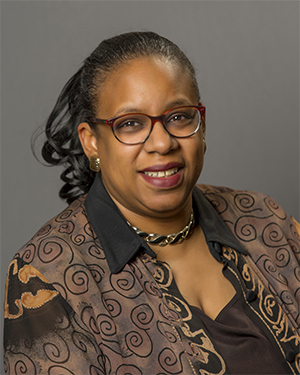Minnesota State Equity 2030

By 2030, Minnesota State will close the educational equity gaps across race and ethnicity, and socioeconomic status at every Minnesota State college and university. This is the moonshot goal that we call Equity 2030. It is a staggeringly ambitious goal and one that requires both intentional culture change and innovation, as well as advocacy and leadership with partners and stakeholders across the state. Equity 2030 is a search for education strategies and policy review to improve outcomes for underperforming students from all backgrounds.
Minnesota State recognizes that it must adapt and change its systems and cultures to meet the needs of today’s students, rather than expect today’s students to learn or adapt to the systems and culture of yesterday’s higher education. These efforts require intentionally prioritizing capacity-building to make change across all levels of Minnesota State and empowering individuals regardless of title or responsibility to examine, explore, and experiment with evidence-based innovation to close attainment gaps.
Equity 2030 is our foundational goal, serving as the organizing principle for all our work, our operational structures, policies and procedures, and for the inclusive, safe, and anti-racist organizational ethos we strive for. It unites our resolve and drives a strong sense of urgency towards achieving the goal.
The focus of Equity 2030 includes:
![]() Enhanced Access to a higher education by strengthening partnerships and collaboration with K-12, business and industry, community-based organizations, and philanthropic partners to expand and grow current programming and identify new ways to support students
Enhanced Access to a higher education by strengthening partnerships and collaboration with K-12, business and industry, community-based organizations, and philanthropic partners to expand and grow current programming and identify new ways to support students![]()
Academic Success by establishing guided learning pathways that focus on academic preparation, progression, and accomplishment within an area of study and career![]()
Student Engagement within the institution, both academic and non-academic, including supporting basic needs
![]()
Evidence-based decision making by building a technology infrastructure and expanding capacity for deeper data analytics![]()
Financial Resources for students and growing the financial resource base for campuses
![]() Workforce and Talent Diversity by incorporating the local and national context with the changing student and employee demographics and needs - focusing on cultural competence development, inclusive hiring practices, and improved campus climate
Workforce and Talent Diversity by incorporating the local and national context with the changing student and employee demographics and needs - focusing on cultural competence development, inclusive hiring practices, and improved campus climate
To accomplish our Equity 2030 goal, we must ensure that the strength of our diverse institutions is not lost while, at the same time, ensure our system can continue to serve all residents of Minnesota. Transformational and collaborative work toward this goal is happening throughout the Minnesota State system, with support from all of our campuses, our presidents, our bargaining units, and our faculty and staff.
We’re all working on this together because the core value for Minnesota State is to provide an opportunity for all Minnesotans to create a better future for themselves, for their families, and for their communities.
The workforce of tomorrow will be increasingly diverse, and tomorrow’s employers will have to engage communities, recruit employees, and serve customers that are more diverse than they are today. Given 75% of emergent jobs in Minnesota will require postsecondary education, it is crucial that Minnesota State colleges and universities educate, prepare, and credential tomorrow’s employees. 
The colleges and universities of Minnesota State have always served more Black and Indigenous students, and students of color (currently 66,000) and more low-income students (currently 69,000) than all of the other higher education providers in Minnesota combined.
Closing the educational equity gaps ensures prosperity for all our students, their families, and the communities in which they live. It is a moral imperative, an economic imperative, and imperative for meeting Minnesota’s workforce needs.
Education is meant to be the great equalizer. Advancing equity, and removing barriers that stand in the way of all students’ success is the only way to disrupt entrenched systems and barriers that have impeded disadvantaged students from achieving their potential.
Educational equity is an economic imperative, key to Minnesota’s future workforce and a thriving economy
In order for the state to prosper Minnesota State must offer all students an equitable chance to succeed.
Recognizing the power of education to transform lives, Minnesota State is deeply committed to this work. Only by addressing systemic and structural inequities in educational access and outcomes, can we help our students build a better future for themselves, their families, and our communities. It will require both intentional systems and culture change and innovation, as well as advocacy and leadership with partners and stakeholders across the state to accomplish.
Equity 2030 aims to bring about greater success for all our students through the removal of barriers which impede success and equitable outcomes. This work is about a fundamental shift in our approach to educating and supporting the success of our students.
Students, especially those in historically marginalized groups, experience many external barriers such as economic fragility, mental health issues, food and housing insecurity, and issues with childcare, transportation, and racism, as well as internal barriers such as registration holds, financial aid, overburdened advisors, etc.
The conditions and factors that have created disparities are not easily siloed and solved. Jobs, housing, education, employment, health, and food security are parts of a deeply interconnected system. To ultimately be successful, Equity 2030 requires not only partnership and collaboration among our schools, but in building and strengthening partnerships across sectors with businesses, industry, nonprofits, K-12, philanthropic organizations, local and state government, and within our communities.
Our colleges and state universities have been focusing on closing the educational attainment gaps for decades. Improving access and academic outcomes, especially for those students from historically underserved populations, are woven into the core values of Minnesota State. However, the educational equity gaps persist.
Approved by the Board of Trustees in 2019, Equity 2030 emerged out of a year-long exploration to reimagine the future of higher education, setting a clear direction for the 26 colleges and 7 state universities of Minnesota State.
In January 2020, Chancellor Malhotra appointed four Equity 2030 Chancellor’s Fellows from among Minnesota State faculty across the state to generate an essential knowledge base to lay the philosophical and practical groundwork for Equity 2030. The Fellows were appointed for six months and were each tasked with collecting information on best practices and developing recommendations to provide the Equity 2030 strategic plan with a solid, evidence-based underpinning. We thank the Fellows for their leadership and ongoing support for Equity 2030!
Strategic direction for Equity 2030 is provided by Chancellor Devinder Malhotra and the members of his cabinet. Coordination for Equity 2030 is the responsibility of the Vice Chancellor of Equity and Inclusion, Andriel Dees, who is advised and assisted by the members of the Minnesota State Office of Equity and Inclusion, as well as other key stakeholders and constituent groups.

Andriel Dees
Vice Chancellor for Equity and Inclusion
As Vice Chancellor for Equity and Inclusion, Andriel has oversight responsibilities for the system-wide strategy to support diversity, equity and inclusion. Prior to joining Minnesota State, Andriel served as the Director of Equity, Diversity and Inclusion at Capella University, Chief Diversity Officer at University of Wisconsin River-Falls, and Associate Dean of Multicultural Affairs at William Mitchell College of Law (now Mitchell Hamline).
Andriel holds a Juris Doctorate from William Mitchell College of Law in St. Paul, Minnesota and a Bachelor of Arts degree in English from Hampton University in Hampton, Virginia.
Equity 2030 Chancellor's Fellows
Ruthanne Crapo Kim
Dr. Ruthanne Crapo Kim is a faculty member in the Department of Philosophy at Minneapolis College. She holds a Ph.D. in Philosophy from the Free University of Amsterdam. She previously served as a Chancellor’s Fellow in Academic Equity Strategy. Her main research interests include Environmental Philosophy, Feminist Philosophy, and Decolonial Studies. She has published articles on decolonizing pedagogy, sexual difference theory and race, and ontological labor in the academy. She is the recipient of the 2020 Board of Trustees Educator of the Year Award for Excellence in Teaching and resides in North Minneapolis with her family where she supports Northside youth development.
Dr. Ajaykumar Panicker
Together with Dr. Ruthanne Crapo Kim, Dr. Ajaykumar Panicker developed an advocacy-based change management framework that will help clarify how academic equity efforts can best be accomplished. Additionally, they created an academic equity pre-audit tool designed to assist departments with evaluating their classroom cultures and practices. The tool complements the Equity Scorecard initiative under the leadership of the Office of Equity and Inclusion by narrowing the scope of examination from the institution to the department level.
Dr. Doris Hill
Dr. Doris Hill’s work focused on developing a monitoring and evaluation framework to help measure progress toward closing equity attainment gaps. Dr. Hill’s experience in healthcare and nursing gives her unique insight and perspective to build a framework that recognizes and acknowledges the culture changes necessary to accomplish the broader goals.
Dr. Hill is the Dean of the College of Nursing and Health Sciences at Metropolitan State University. She holds a Ph.D. in Philosophy from the University of Minnesota, School of Nursing and went forward to complete a two-year post doctorate in the School of Medicine with the University of Minnesota – Duluth. Her main research interests include health disparities, mental health and historical trauma. Dr. Hill previously served as a Chancellor’s Fellow in Target Setting. She is a peer reviewer for the Higher Learning Commission (HLC) and received a HLC Peer Corps Hero award in 2018 for her work with a critical substantive change visit. Her past service includes serving as the President and Vice President for the Minnesota Board of Nursing, serving as a council member on the National Advisory Council on Nurse Education and Practice, advisory member for the Minority Fellowship Program through the Substance Abuse Mental Health Services Administration (SAMSHA) and advisory member for the UCLA, School of Nursing, Center for American Indian/Indigenous Research and Education.
Dr. Jeff Ueland
Dr. Jeff Ueland has been working closely with staff from the Academic and Student Affairs Office of Research to explore and evaluate campus capacity to engage in high-level predictive analytics. His communications with campus institutional research staff have enabled him to further develop a plan for data democratization and will help provide information to those working on the NextGen Enterprise Resource Planning (NextGen ERP) implementation to ensure Minnesota State campus staff are able to access the disaggregated data they will need to monitor their Equity 2030-related efforts.
Minnesota State acknowledges the land and the tribal nations upon whose land this work is being accomplished. We acknowledge that we are on Dakota land. We recognize the Native Nations of this region who have called this place home over thousands of years including the Anishinaabe (Ojibwe), Lakota, Nakota, Ho-Chunk, and Cheyenne. We acknowledge the ongoing colonialism and the legacies of violence, displacement, migration, and settlement that foreground the formation of Minnesota State Colleges and Universities and subsequently this report. We commit to advancing critical efforts to understand and address these legacies, including the larger conversation of reparations, repatriation, and redress urgently needed for the scope of ethical acknowledgment to begin in earnest.
This statement was developed by the Minnesota State Equity 2030 Chancellor’s Fellows and is reproduced here with their permission.
With thanks to Iyekiyapiwin Darlene St. Clair (2020) for her guidance that “land acknowledgements need to include the present, be more than a list, refer to a commitment, and give some broader context.”